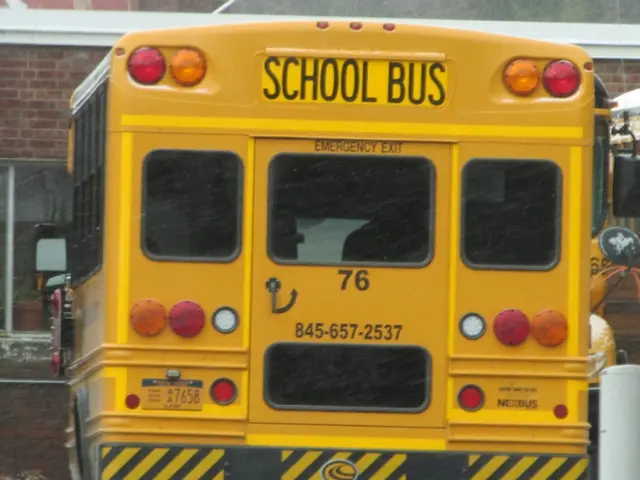Strengthening Lasting Relationships in 2024: Cultivating Lifelong Connections
Friendships are the colorful threads that create the vibrant tapestry of our lives, weaving together a variety of experiences, emotions, and connections. Grasping the essence of these valuable relationships is crucial. They are more than mere companionship; they provide support, confidants, and mirrors that shine a light on our true selves.
Exploring why friendships matter is not just a question; it's a deep dive into the importance of these lifelong bonds. From childhood playmates to adulthood confidants, friends play a pivotal role in our lives. They share our joys, alleviate our sorrows, and stand by us through thick and thin. Numerous studies underline the positive effects of friendships on our mental health, well-being, and overall happiness.
In this discussion, we delve into the heart of what makes friendships so essential, unraveling the myriad ways they enrich our lives. From laughter to tears, from celebrations to commiserations, friends accompany us through every chapter of our personal narratives.
A glimpse of what’s to come gives us a roadmap for this exploration. We'll dissect the intricate dynamics of friendships, exploring the significance of nurturing and maintaining these precious bonds. From effective communication to resolving conflicts, from overcoming challenges to celebrating growth, each section offers insights and strategies for cultivating and cherishing friendships that shape our lives. So, let's embark on this journey together, as we delve into the depths of friendship and connection.
The Value of Friendships
Defining friendships is about more than a dictionary description; it involves understanding the intricate dynamics that make these relationships so special. fundamentally, friendship is a bond forged in mutual trust, respect, and affection. It’s finding a kindred spirit - someone who understands us in ways no one else does. True friendship transcends labels and boundaries; it endures the tests of time and circumstance.
The importance of support cannot be overstated when it comes to friendships. Friends are our pillars of strength and our rocks in times of strife. They offer a listening ear, a shoulder to lean on, and a hand to hold when life throws curveballs. Whether celebrating triumphs or comforting in defeats, friends offer unwavering support that sustains us through life’s highs and lows.
Shared experiences form the bedrock of many friendships. Whether embarking on wild adventures or simply sharing a quiet moment over a cup of coffee, these common experiences become the threads that weave the fabric of our friendships. From childhood escapades to adult escapades, the memories we create together become the bolts that hold our friendships together.
At the heart of every strong and lasting friendship lie trust and understanding. These two pillars create the foundation upon which all other aspects of friendship are built. Trust allows us to be vulnerable, to open up, and to share our deepest thoughts and feelings without fear of judgment. Understanding fosters empathy and compassion, enabling us to see things from our friend’s perspective, offering support and guidance during their journey. In a world fraught with uncertainty, having someone we can trust and understand is a priceless gift that enriches our lives immeasurably.
Nurturing lifelong bonds
Communication and connection serve as the lifeblood of any friendship, nourishing the bond and keeping it strong through the ups and downs of life.
Open communication is the cornerstone of every healthy relationship. It involves being transparent, honest, and vulnerable with our friends. By sharing our thoughts, feelings, and experiences openly, we deepen our connection, build trust, and create intimacy. When we communicate openly, we create a safe space where our friends feel comfortable doing the same, fostering a deeper understanding and appreciation for each other.
Active listening is equally vital in nurturing lifelong bonds. It’s not just about hearing the words spoken, but truly understanding the emotions and intentions behind them. When we actively listen to our friends, we validate their feelings, demonstrate empathy, and strengthen the bond of trust between us. By putting aside distractions, maintaining eye contact, and providing supportive feedback, we show our friends that their words matter, and we value their perspective.
Staying connected requires intentional effort and commitment. In today’s fast-paced world, it’s easy to let friendships fall by the wayside amid busy schedules and competing priorities. Setting aside time for regular catch-ups, meaningful conversations, or even quick texts to check in, ensures that our friendships remain vibrant and enduring.
Resolving Conflict
Conflict resolution strategies are essential tools for maintaining healthy and harmonious friendships. Disagreements are inevitable in any relationship, but how we handle them can either strengthen or strain the bond between friends.
Handling disagreements with respect and empathy is crucial for resolving conflicts effectively. It’s essential to approach disagreements with an open mind, acknowledge our friend’s perspective, and treat them with dignity and understanding. By refraining from personal attacks and actively listening to each other’s viewpoints, we work towards finding a mutually acceptable resolution, preserving the integrity of our friendship.
Navigating conflicts teaches us forgiveness, patience, and resilience. Instead of viewing conflicts as obstacles, we can choose to see them as opportunities for growth. By navigating through challenges together, we not only resolve immediate issues but also develop skills and values that enrich our friendships. Forgiveness and moving forward are integral parts of the conflict resolution process.
Overcoming Challenges
Time and distance can present significant obstacles in maintaining and nurturing friendships, but overcoming these challenges ensures friendship remains strong and enduring.
Managing busy schedules is often cited as a primary barrier to maintaining friendships, especially in today’s fast-paced world. However, finding ways to prioritize friendships amidst other commitments is essential for creating meaningful connections. By setting aside dedicated time for phone calls, face-to-face meetings, video chats, or just quick texts, we demonstrate our commitment and show our friends they are valued and appreciated.
Long-distance friendships present unique challenges, as physical distance can make regular face-to-face interactions difficult. But with the help of technology, staying connected becomes easier. Video calls, social media, and messaging apps bridge the gap, allowing us to maintain connections regardless of distance. Additionally, making plans to visit each other whenever possible can help keep the bond strong despite the miles between us.
Changing Dynamics
Life transitions can bring significant changes in friendships, but these changes offer opportunities for growth and deeper connection. Whether it’s starting a new job, moving to a new city, getting married, or starting a family, it’s essential to support our friends through their life changes and milestones.
Evolving relationships are a natural part of any friendship. As we grow, our priorities, interests, and roles within friendships may change. In some cases, friendships might drift apart as our lives take different paths. Although this can be difficult, it’s essential to accept that change is inevitable and focus on cultivating relationships that remain strong and continue to enrich our lives.
The key to navigating changing dynamics is to cherish the memories shared with our friends, stay curious about their lives, and adapt to the changing circumstances while maintaining an open heart and mind. By doing so, we can ensure longevity in our friendships and continue to derive joy from our connections.
FAQs
What should I do if I feel like my friend is drifting away?
Feeling like a friend is drifting away can be distressing, but addressing the situation proactively is essential. Start by reaching out to your friend and expressing your concerns in a non-confrontational manner. Be honest about how you feel and ask if there’s anything going on that’s causing the distance. Sometimes, life gets busy, and friendships can take a backseat unintentionally. By initiating an open and honest conversation, you can work together to identify any underlying issues, find ways to reconnect, and strengthen your bond.
How can I rebuild a friendship after a major disagreement?
Rebuilding a friendship after a major disagreement requires patience, understanding, and a willingness to forgive and move forward. Start by acknowledging the hurt or damage caused by the disagreement and expressing genuine remorse if necessary. Then, focus on rebuilding trust by actively listening to your friend’s perspective, validating their feelings, and demonstrating empathy and understanding. Communication is key during this process, so be sure to keep the lines of dialogue open and transparent. Lastly, remain patient and give your friend time to heal. Rebuilding a friendship takes time and effort, but with dedication and commitment, it’s possible to mend the bond and move forward stronger than before.
Is it normal for friendships to change over time?
Yes, it’s normal for friendships to change over time, as people grow, evolve, and experience life’s different phases. Friendships that once seemed inseparable may naturally drift apart as interests, priorities, and life circumstances change. However, change doesn’t automatically signify an end to these bonds. By nurturing our friendships, embracing the evolution, and prioritizing the memories and moments that bring joy and enrich our lives, we can endure the changes and forge stronger connections.
What are some ways to make new friends as an adult?
Making new friends as an adult can be challenging but not impossible. Here are some strategies to meet new people and build meaningful connections:
- Join clubs, organizations, or community groups based on shared interests or hobbies, like book clubs, sports leagues, or volunteering for causes you’re passionate about.
- Attend social events, networking mixers, or workshops where you can meet like-minded individuals.
- Engage in conversations with people you encounter daily, like cashiers, gym instructors, or coworkers.
- Utilize social media platforms and apps to meet new people with similar interests.
- Be open to introducing yourself to new people, and have a genuine interest in getting to know others.
How do I know if a friendship is worth investing in?
Investing time and energy into a friendship is a significant commitment, so it’s important to evaluate the relationship to determine its worth. Here are a few signs that a friendship might be worth investing in:
- You feel mutually understood, supported, and appreciated.
- The connection makes you feel good about yourself, encourages growth, and brings you joy.
- The friendship is based on shared values, beliefs, and passions.
- You never feel drained or uneasy, and the relationship improves your overall well-being.
- You enjoy spending time together, looking forward to future interactions, and nurturing the bond.
If a friendship shows several of these attributes, it’s likely worth investing your time and energy.
In the journey of understanding what makes friendships so precious, we uncover that they are more than just companionship; they are pillars of strength, confidants, mirrors reflecting our true selves, and actively participant in our personal growth (education-and-self-development, personal-growth). friendships serve as lifelong companions, sharing our joys, alleviating sorrows, and standing by us through thick and thin (lifestyle).
Nurturing and maintaining these bonds requires effective communication, active listening, and intentional effort to stay connected (education-and-self-development, resilience). Communication is the lifeblood of any friendship, fostering intimacy, building trust, and creating a safe space for mutual vulnerability (relationships). Active listening demonstrates empathy, understanding, and validates our friends' emotions and intentions, deepening the bond of trust between us (relationships).
Overcoming conflicts and challenges enhances the strength of friendships by teaching forgiveness, patience, and resilience (resilience). Navigating disagreements with respect and empathy and focusing on finding a mutually acceptable resolution preserves the integrity of the friendship (resilience). Time and distance can pose challenges, but staying connected through technology and setting aside dedicated time for communication ensures friendships remain vibrant and enduring (lifestyle).
Changing dynamics in friendships are a natural part of life transitions. Embracing the evolution, cherishing shared memories, and adapting to changing circumstances while maintaining an open heart and mind ensures a lasting bond (relationships). In navigating changing dynamics, staying curious about our friends' lives and supporting them through life's changes and milestones helps maintain our friendship and assures us of joy derived from our connections (relationships).







